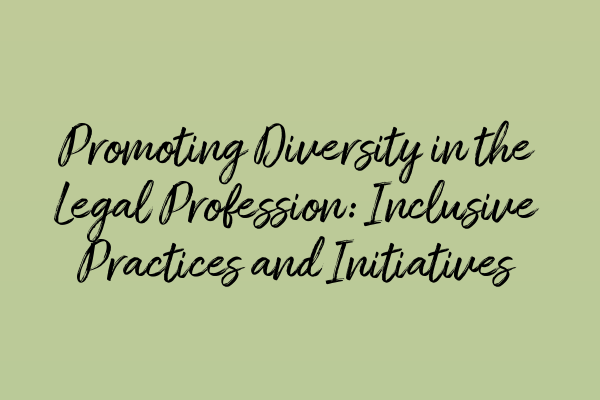Promoting Diversity in the Legal Profession: Inclusive Practices and Initiatives
Introduction
In today’s evolving world, acknowledging and promoting diversity within the legal profession has become more crucial than ever. As a solicitor and advocate for inclusivity, I firmly believe that embracing diverse perspectives, experiences, and backgrounds is not only morally right but also essential for the growth and success of the legal industry. In this blog post, we will explore the importance of promoting diversity in the legal profession and discuss several inclusive practices and initiatives that can help create a more inclusive and vibrant legal community.
Why is Diversity Important in the Legal Profession?
1. A Better Representation of Society:
Promoting diversity ensures that legal professionals more accurately reflect the diverse society they serve. It enables lawyers to empathize with and understand the needs, values, and concerns of clients from different racial, ethnic, cultural, and socioeconomic backgrounds. A diverse legal profession fosters trust, promotes open-mindedness, and facilitates better communication between lawyers and their clients.
2. Enhanced Decision-Making:
An inclusive legal profession brings together individuals with diverse perspectives, ideas, and talents. When a legal team comprises individuals with different backgrounds and experiences, the collective decision-making process benefits from a wider range of insights. Diverse legal teams spur creativity, innovation, and critical thinking, leading to more robust and holistic approaches to legal issues.
3. Increased Access to Justice:
Promoting diversity in the legal profession also improves access to justice for underrepresented communities. Lawyers from diverse backgrounds can effectively serve communities facing systemic discrimination, inequality, and social injustice. By bridging the gap between the legal system and marginalized groups, diverse legal professionals can contribute to a fairer and more equitable society.
Inclusive Practices and Initiatives to Promote Diversity
1. Recruitment and Retention Programs:
Law firms, legal organizations, and educational institutions should implement proactive recruitment and retention initiatives to attract a diverse pool of talent. This can include establishing partnerships with organizations representing minority law students, hosting career fairs targeting diverse candidates, and offering mentorship programs for underrepresented individuals in the legal profession.
2. Diverse Hiring Panels:
To ensure fair evaluation and selection processes, firms and organizations should have diversity in their hiring panels. By having diverse perspectives at every level of decision-making, potential biases and barriers can be eliminated, resulting in a more inclusive workforce.
3. Cultural Competence Training:
Offering cultural competence training to legal professionals can improve their ability to interact sensitively with clients from diverse backgrounds. This training equips lawyers with the knowledge and understanding necessary to navigate the complexities of cultural differences and ensures that all clients receive equitable and respectful legal representation.
4. Affinity Groups and Employee Resource Networks:
Establishing affinity groups and employee resource networks within law firms and organizations allows diverse professionals to connect, support, and mentor one another. These groups provide a safe space for sharing experiences, discussing challenges, and developing strategies to overcome obstacles faced by underrepresented communities.
5. Mentorship and Sponsorship Programs:
Creating mentorship and sponsorship programs enhances career advancement opportunities for diverse legal professionals. These initiatives pair experienced lawyers with junior lawyers from underrepresented backgrounds, providing guidance, support, and opportunities for professional growth.
6. Pipeline Programs:
Collaborating with educational institutions and community organizations, legal professionals can help create pipeline programs that introduce students from diverse backgrounds to the legal field. These programs can include internships, workshops, and mentoring opportunities, inspiring and preparing young individuals for a career in law.
Conclusion
Promoting diversity in the legal profession is not just a moral imperative; it is a strategic move towards creating a stronger, more inclusive legal community. Embracing diversity fosters understanding, drives innovation, and ensures equal access to justice for all. By implementing inclusive practices and initiatives, we can catalyze positive change in the legal profession and build a future where diverse voices are heard, celebrated, and empowered. Together, let’s work towards a more equitable legal profession that reflects the rich diversity of our society.


Leave a Reply